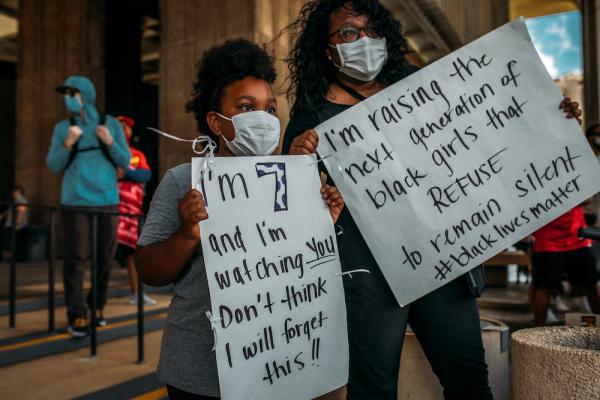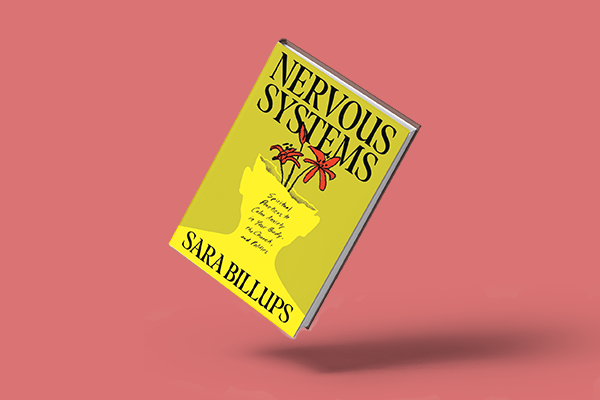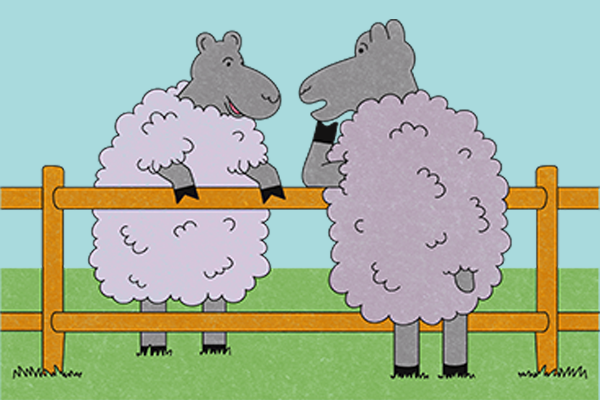As a kid I would sometimes walk outside to look up at the night sky. I didn’t really know the names of the stars or what their particular alignment meant. I couldn’t tell the Big Dipper from the Little Dipper. I just knew that I wanted to go out there. There. There was something about the beyond that intrigued me — something about staring up that made me become lost in the moment, engulfed in the possibilities of freedom, not bound by time or place, flying in the Great Deep.
I think every child at some point has those great dreams, experiences of a fleeting passion to explore the vast range of beauty that God has given us. They, like me, look up and want to be free. Was it passion, was it a prayer, or was it hope? What was it about this world that made one want to leave?
I’m not sure, but I do know that too often our children — our Black children — have their hopes and dreams snatched from them. In her recent essay, "The Trayvon Generation," Elizabeth Alexander paints a picture of the young people growing up in the last 25 years. We are a generation that has known that hashtags for us are also history books, chronicling the journey of young people who look just like us.
Their journeys have ended. Too early. Dreams destroyed, as we watched the stories come across our feeds, forcing us once again to call out in helpless rage. “These stories,” Alexander writes, “helped instruct young African-Americans about their embodiment and their vulnerability.” They were stories of terror. They were stories that didn’t keep one's eyes in the skies too long. We knew that we had to come back down and learn how to survive this world. These stories let us know that “anti-black hatred and violence were never far.”
I worry about my son so much. He’s only 1, but I know deep down that this is the world that I have to prepare him for. I used to try to suppress what I felt about this world: If I could just keep running from it, then maybe it would all turn all right. If there was anything I knew how to do, it was run. As a kid, I was pretty fast. I would be the one everybody wouldn’t want to race. I was also a scared kid. If there was danger that I could spot, I would take off. Young Reggie Bush. I would run, and run, and run, and run. Maybe this is why I worry so much for my son. I know that no matter how much we try and run from it all, it will still be there. We have to face it.
Alexander worries about my generation, a generation of young Black people who undoubtedly are dealing with depression and trauma. I feel that. “It isn’t just the spectre of race-based violence and death that hangs over these young people,” she writes. “It’s that compounded with the constant display of inequity that has most recently been laid bare in the COVID-19 pandemic, with racial health disparities that are shocking even to those of us inured to our disproportionate suffering.” We see this world, we are angry — but most of all we are numb. It’s the type of numb that feels but doesn’t, that wonders and dreams but doesn’t. It is the type that creates but doesn’t. Turning her eye to one of our generation’s creative icons, Kendrick Lamar, she wonders one question: “Why is Kendrick so sad?”
That question. Why are we so sad? This brings to mind Juice WRLD.
I became familiar with Juice as I was working out and his song “Lucid Dreams” came across my playlist. After his passing, I read a wonderful reflection on his life and music in the New Yorker, "The Beautiful Vulnerability of Juice WRLD," in which author sought to give voice to the vast range of complexities captured in the life of one young and gifted artist. She noted that the world often speaks of Black boys and their anger but rarely of their sadness; Juiced forced us to see that. He offered us his anxiety and fears with candor as he poured his heart out in his lyrics. He rapped about things that people normally numb themselves to. Like pills or alcohol, “the romances that absorbed him were just another way to disappear, another way to feel something else.” His sincerity spoke deeply to a generation that has been raised to believe that vulnerability was death and that transparency was not bravery but bullshit.
The author noted his passing was so devastating because, “His lyrics suggested that he could never see any other outcome for himself.” And that’s what I’m afraid of for this generation: Many will never see any other outcome for themselves. We have voted; elections were still stolen. We have gone to school; we are still lynched. We have good jobs, we have families, we have changed our mindset, we are mentoring, praying, and preaching. We are doing those moral things people told us would save us. And what of it?
Alexander reminds us that Black creativity was born out of response to an anti-Black world. To stand in the face of danger, to hold on to one’s imagination of a better world, to hope in the midst of unbearable social suffering, to remember one’s dead in a world that forgets — these become gospel to a people bent and broken. “Theology cannot, must not,” M. Shawn Copeland writes, “remain silent or complicit before the suffering of a crucified world and the suffering of God’s crucified people.” Creative responses to such suffering, the Black artist’s imagination, “evokes our integrity, calls us to responsibility for one another, calls us to entrust our lives to the dangerous Jesus.”
This is why the phrase Patrisse Cullors, Alicia Garza, and Opal Tometi let loose in the world, “Black Lives Matter,” is good news in a world that forgets. It is a phrase that needs to be said again and again — one simply has to look at the pervasive violence against Black lives laid bare in Rayshard Brooks and the Black men hanging from trees in 2020 and our tragic failure of Black women like 19-year-old Oluwatoyin ‘Toyin’ Salau. Even as I write this, five years ago this week, the massacre at Mother Emanuel happened. Each year, further assault on our humanity.
The phrase "Black Lives Matter," like Joseph’s request to take his bones wherever his people go, is to keep memory alive. To keep it alive is to fight for us when we can't fight for ourselves. It is to remind us that though our world may forget us, there is One who does not. So even as people shout loud “look how much progress this country has made; be grateful,” we understand that, as Angela Davis writes, “freedom is a constant struggle.”
The same horrors or forebears experienced, we are. The same tragedies that they endured, we have. The same words they spoke, we say. The same complicity they encountered, we do. The same fight they fought, we’re fighting. The same vision they saw, we see. The struggle for love, power, and justice is not a destination — it is a discipline.
We are not optimistic because we understand, as King said, that “when Negroes looked for the second phase, the realization of equality, they found that many of their white allies had quietly disappeared.” Too often simple awareness has not led to deep-seated rage over injustice. Because there is no rage that burns away the illusion that this is not normal, such calls for change do nothing to change the given system of racial and economic injustice we are trying to breathe in. Risks are calculated with white comfort in mind — so as not to arouse white backlash — over the tragic, ongoing conditions of second-class citizenship, racist exploitation, and disrespect. And such risk is not love; such risk is indifference.
Yet, what remains for us is a hope unbroken, bound to the memory of Jesus and ancestors who refused to be crushed. This hope is not a point, but a practice.
We are those who would be Black and beautiful, bold and courageous, brilliant and connected. We are pastors, we are activists, we are writers, we are blue collar workers, we are artists, we are poets, we are teachers, we are politicians, and more. We have had to try and find joy in the midst of racial terror. As Alexander writes of her sons (and us): “They are beautiful. They are funny. They are strong. They are fascinating. They are kind. They are joyful in friendship and community. They are righteous and smart in their politics. They are learning. They are loving. They are mighty and alive.” They are us, we are them. We continue to struggle because we are free — even if we’re bound. Our very public protest for our freedom is beauty. If beauty, as Fyodor Dostoevsky noted, will save the world, then our Black is beautiful. It is profoundly spiritual, powerful. It is radical trust, radical centering, radical faith in the midst of human darkness.
In the place of anti-Blackness, we are working for dignity. In the place of oppression, we are working for power. In the place of forgetfulness, we are remembering those whose dreams have been snatched from them. In the place of segregation, we are standing in solidarity with one another. When we say Black Lives Matter, we mean it.
I don’t know if what we are doing now will make a dent in the world, in a world that I may lose my son or my son may lose me, or my wife lose her husband, or my wife lose her son. I don’t know. I just know one thing: Every day we wake up, we are in search of a better country.
Got something to say about what you're reading? We value your feedback!






